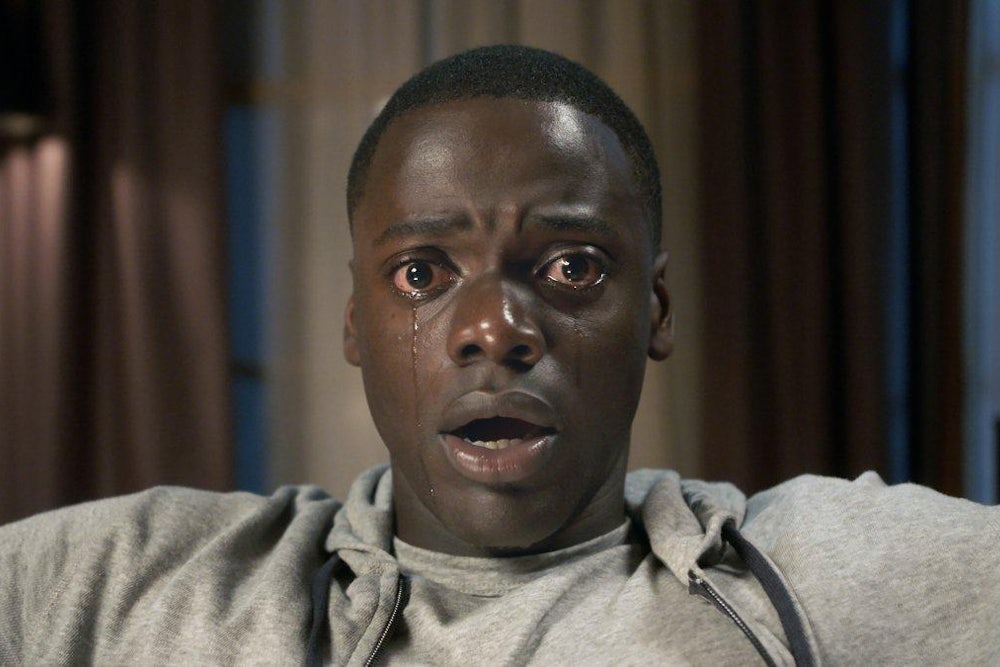Of the many magic tricks that Get Out pulls off, the most impressive one is how it turns the smiling face of a friendly white person—who’s just here to help, who happily voted for Barack Obama twice—into a rictus grin as terrifying as a Michael Myers mask. Everywhere our hero Chris turns, there is a reassuring white face telling him everything’s going to be OK, that nothing odd is afoot, that he’s overreacting to the increasingly strange and terrible things that are coalescing directly around him. No, no, don’t worry, they say. They mean well. There’s nothing to be concerned about. They don’t have a racist bone in their bodies. C’mon, Chris, why are you so nervous?
Get Out gives Chris every reason to be nervous. The film, written and directed by Key & Peele’s Jordan Peele, introduces Chris (in an instant star-making performance by British actor Daniel Kaluuya) and his girlfriend Rose Armitage (Allison Williams) as they are preparing to visit her family in the suburbs. Chris warns her that it’s a mistake that she hasn’t told them he’s black, but she tells him he’s being silly: They’re the least racist people in the world! And when he meets her parents (Bradley Whitford and Catherine Keener), they’re friendly and welcoming and pleased to have him, even as Dad keeps putting his foot in his mouth every time he tries to address (or tries to avoid addressing) Chris’s race.
But weirdness keeps popping up, from Rose’s creepy lax bro brother (Caleb Landry Jones) to Mom’s predilection for hypnosis to, most of all, the black maid and black housekeeper, who have the vacant stares and empty cadence of hostages. Chris keeps expressing concern, both to Rose and over the phone to his best friend Rod (LilRel Howery), but Rose keeps telling him he’s overreacting. Rod is less certain. Chris should listen to Rod.
The movie is clever both in conception and execution, but there aren’t that many belly-laugh moments: As far as horror-comedies go, this is more horror than comedy. This is a movie that is meant to unsettle, and its occasional impersonations of a traditional comedy only work to serve that purpose. You’re never quite sure what’s going on at that upstate home, whether everyone’s involved in some larger sinister plot or if it can all be chalked up to awkward misunderstandings. But it’s clear that something is happening: Chris is the most normal person here, and we’re not given any reason to doubt him.
If anything, Chris underreacts to what’s happening, which is another point of the movie: There’s constant pressure on Chris, from all sides, for him to let go of his reservations, to accept that the Armitage family’s behavior is normal, to be polite. The title of the movie is only said once in the film, but it’s a moment of extreme urgency. In a film where almost no one is upfront about their intentions, the primal scream of “Get Out!!!!” stirs the movie up. Someone is yelling exactly what the audience is thinking.
Peele is smart not to overdo his central metaphor: That the surface gentility of “liberal” whites, the “good ones,” disguises something angry and parasitic. He never gets bogged down in some sociological polemic. He’s actually a little better about establishing tension than releasing it: Once the gig is up and we discover precisely why the Armitages and all their neighbors have been acting so curious, the movie turns into a more traditional horror movie, with its obligatory shock-cuts and gore.
Peele’s a skilled director of all that—he’s got an eye for composition, of how to fill a frame with creepy, unsettling little details. But there is an inevitable letdown when this decidedly unconventional movie settles into more familiar territory. Peele is unerring in setting up the strange world of the Armitages, but relaxes into tropes when Chris needs to escape it. As a Blumhouse horror film, however, this might just be delivering the goods the audience is there for in the first place. You can’t sneak a societal critique into a slasher flick without ultimately giving the audience the slasher flick they paid for.
The movie is splendidly cast from top to bottom, starting with Kaluuya and extending to Keener and Whitford (along with an unnerving small role for Stephen Root). The standouts, though, are the Armitage siblings. Jones is a nervy, jutting actor, who comes at his scenes from surprising angles; you won’t be able to quite figure out what he’s getting at, but it’s terrifying to watch him go about it. (A lacrosse stick has never looked so menacing.) But can I say that Allison Williams is pretty excellent as well? The Girls star’s film debut is a deceptive one, in which she appears to be just another bland suburban white girl before shifting into a much more compelling role. The reveal is that that suburban blandness is its own specific sort of menace, privilege that must be protected at all costs.
Get Out has its surface scares, but it’s what’s lingering beneath that’s most frightening: The sense that no matter where you turn, no matter how many people claim they’re on your side...they’re out to get you. Every face is a Jason mask. Every room is a trap. Every choice is the wrong one. Get Out makes the everyday horrifying, and inescapable.
Grade: B+
Grierson & Leitch write about the movies regularly for the New Republic and host a podcast on film. Follow them on Twitter @griersonleitch or visit their site griersonleitch.com.
